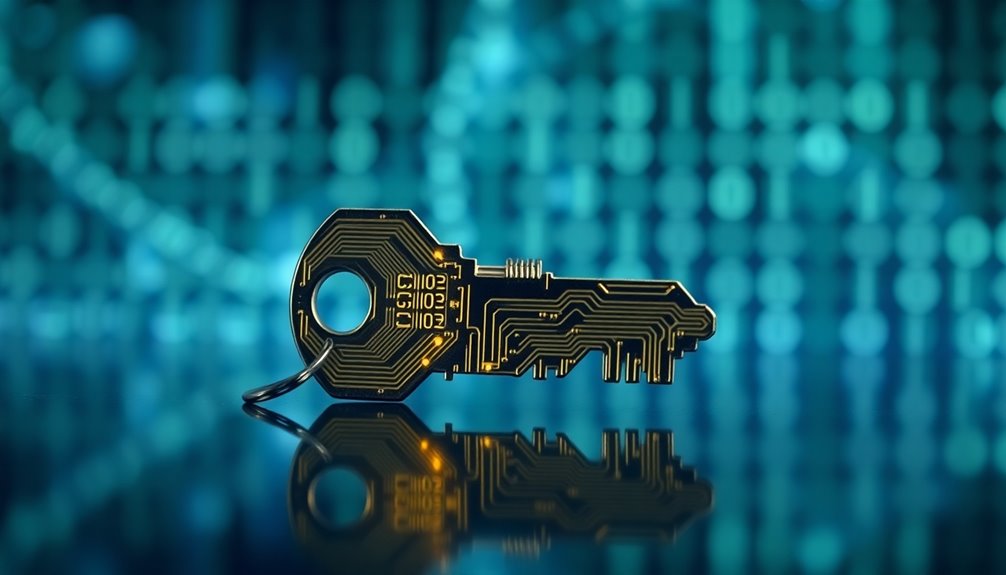A blockchain address is your unique key for sending, receiving, and storing digital assets on the blockchain. It's created from a public key and appears as an alphanumeric string, varying by network—like Bitcoin or Ethereum. While your public address is visible for transactions, your private key must remain confidential to protect your assets. Proper security measures, like using hardware wallets or multi-signature systems, are crucial to safeguard your private keys. Understanding the different address types and their functions can help you manage your digital wealth effectively. There's more to explore about securing your assets and enhancing privacy.
Key Takeaways
- A blockchain address is a unique identifier for wallets, enabling the sending and receiving of digital assets securely.
- Blockchain addresses are derived from public keys, using algorithms like SHA-256 to ensure uniqueness and security.
- Different cryptocurrencies have specific address formats, such as Bitcoin's '1', '3', or 'bc1' prefixes, enhancing functionality and privacy.
- To protect your assets, keep private keys confidential and consider multi-signature wallets for added security.
- Regularly audit your security measures and utilize hardware wallets to safeguard your blockchain addresses from potential threats.
Understanding Blockchain Addresses

When you dive into the world of cryptocurrencies, you'll quickly realize that blockchain addresses serve as unique identifiers for wallets and smart contracts.
These alphanumeric strings play a crucial role in sending, receiving, and storing digital assets on the blockchain network. Typically generated from a public key, the address structure varies by network, with Bitcoin addresses ranging from 26 to 35 characters in length. Some networks even include a checksum for validation. Blockchain addresses enable secure, transparent transactions on decentralized networks, facilitating tracking and verification of digital asset movement.
Security measures like encryption and hashing algorithms, such as SHA-256, help protect your information. Remember, public addresses are visible, but your private keys must remain confidential to safeguard your assets against phishing attacks and unauthorized access.
Understanding these addresses is essential for secure digital transactions.
How Blockchain Addresses Are Generated

Blockchain addresses are generated through a systematic process that begins with the creation of a private key. This private key is a randomly generated string of characters used to sign transactions and verify wallet ownership. Once you have your private key, a corresponding public key is created, serving as a unique identifier for your wallet. Importantly, crypto wallets are essential for managing these addresses and ensuring the security of your digital assets. Understanding the concept of a selfcustodial wallet explained is crucial, as it empowers users to maintain full control over their private keys and funds, eliminating reliance on third-party services. This approach not only enhances security but also aligns with the decentralized ethos of blockchain technology, allowing individuals to safeguard their investments more effectively.
The public key is then hashed using algorithms like SHA-256 to produce the final blockchain address. This process often includes a checksum for validity. Here's a summary of the key steps:
| Step | Description | Purpose |
|---|---|---|
| Private Key Generation | Random string creation | Signs transactions |
| Public Key Derivation | Algorithmically derived from private key | Unique wallet identifier |
| Public Key Hashing | Hashing using algorithms | Generates blockchain address |
| Address Encoding | Base58 encoding for readability | Ensures address consistency |
Different Types of Addresses

Various types of blockchain addresses exist, each designed for specific use cases and networks.
For Bitcoin, you've got P2PKH addresses starting with '1', P2SH addresses starting with '3', Bech32 addresses starting with 'bc1', and the newer Taproot addresses starting with 'bc1p'.
Ethereum addresses, on the other hand, start with '0x' followed by 40 hexadecimal characters, making them unique for transactions involving Ether and smart contracts.
Litecoin addresses can start with 'L', 'M', or 'ltc1', while Ripple addresses typically start with 'r'. Each address type serves a distinct purpose, whether it's for enhancing privacy or optimizing transaction efficiency, so understanding these differences is crucial for your blockchain interactions.
Moreover, addresses enable secure and transparent transactions, which are essential for the functioning of blockchain technology.
Functionality of Blockchain Addresses

While you may not realize it, blockchain addresses play a vital role in the functionality of digital transactions. They act as the destination for sending and receiving digital assets, ensuring that the sender's public key matches the transaction data for verification.
With blockchain addresses, transactions become immutable, meaning once recorded, they can't be altered. This facilitates secure, transparent transactions on a decentralized network without intermediaries like banks. You can also track your transaction history, including incoming and outgoing transfers.
Moreover, blockchain addresses rely on cryptographic keys—your public key is visible to all, while your private key remains confidential, allowing you to prove ownership and maintain your anonymity in the digital world. Additionally, transaction verification is ensured through the use of the public key by network participants, reinforcing the integrity of each transaction.
Ensuring Address Security

To keep your blockchain address secure, it's crucial to implement robust security measures that protect your private keys and transaction integrity. Start by utilizing hardware security modules (HSMs) for key storage and consider multi-signature wallets for sensitive transactions. You should also employ role-based access control to limit permissions and safeguard your private keys through digital signatures. Additionally, maintaining strong cryptography is essential to ensure that your transactions remain confidential and tamper-proof.
Here's a quick overview of essential security practices:
| Security Practice | Purpose |
|---|---|
| Hardware Security Modules | Protects private keys from unauthorized access |
| Multi-Signature Wallets | Requires multiple approvals for transactions |
| Digital Signatures | Authenticates transactions |
| Regular Security Audits | Detects vulnerabilities and suspicious activities |
Staying informed and vigilant is key to protecting your assets.
Frequently Asked Questions
Can I Change My Blockchain Address After Creation?
Yes, you can change your blockchain address after creation.
While each address is unique and tied to your wallet, you can generate new ones whenever you need. This can enhance your privacy and security, making it harder for others to track your transactions.
Just remember to document each new address you create to avoid confusion when sending or receiving funds.
Using fresh addresses for transactions is a smart practice to protect your assets.
Are Blockchain Addresses Completely Anonymous?
Did you know that around 85% of Bitcoin addresses are linked to identifiable users?
Blockchain addresses aren't completely anonymous; they offer pseudonymity instead. Your transactions are recorded on a public ledger, making it possible for others to trace them back to your address.
While you don't have to share personal details, deanonymization techniques can sometimes link your address to your identity.
How Long Are Typical Blockchain Addresses?
Typical blockchain addresses range from 26 to 35 characters.
For instance, Bitcoin addresses come in different formats: P2PKH addresses usually have 33 or 34 characters, while P2SH addresses are exactly 34 characters long.
Bech32 addresses, which support SegWit, start with "bc1" and can also vary in length.
When you create a wallet, it randomly generates an address within these ranges, ensuring uniqueness and security for your transactions.
Can I Recover a Lost Blockchain Address?
Can you recover a lost blockchain address? Yes, it's possible, mainly through backup seed phrases that serve as a master key for accessing your wallet.
If you've saved your private key securely, recovery software can help locate your funds.
You might also consider professional recovery services if needed.
Always remember, keeping your seed phrases and private keys safe is crucial to prevent future loss of access to your digital assets.
Do Blockchain Addresses Expire Over Time?
Blockchain addresses don't expire by default, so you can keep using them as long as you maintain access to your private keys.
If you lose those keys or if your wallet service shuts down, you mightn't recover your funds.
However, some platforms do replace addresses after a specific period, so it's crucial to stay updated on your wallet's policies.
Regularly check your addresses to ensure they're still valid for transactions.
Conclusion
In summary, understanding blockchain addresses is crucial for protecting your digital assets. Did you know that around 20% of all Bitcoin in circulation is considered lost, often due to misplaced or forgotten addresses? By grasping how these addresses work and ensuring their security, you can avoid becoming part of that statistic. Always keep your private keys safe and back up your information. With the right knowledge, you can confidently navigate the blockchain landscape and safeguard your assets.









